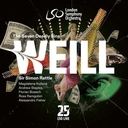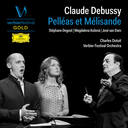I cordially invite you to book a ticket to Berlin, and spend three hours in quite another world - fascinated by the emotional turmoil and dreams of a stranger, as vividly portrayed and beautifully sung by Rolando Villazón. Bohuslav Martinů's seldom performed Julietta (The Key to Dreams) is a resounding success at the Staatsoper Berlin in the Schiller Theater. A complicated puzzle? A Garden of Eden? A siren's song? The surrealist dream opera Juliette is easily all of these.
An early work, Martinů composed this opera while living in Paris. With many nods to Stravinsky, the opera is French in its tonality, and altogether Czech in its pathos. There is only uncertainty in this opera: Where is he? Wasn't that character previously someone else? What will happen? Are we remembering, or forgetting, and which would be most advisable?
Looking back at the events of the period surrounding the composition and première of Juliette a bit of ambiguity seems quite fitting. Although married, Martinů had recently lost a lover, and would soon be on a Nazi Black List for his involvement in the Czech resistance. Austria had just been annexed by Germany. Pathos, anxiety and surrealism were themes of the day. Martinů himself indicated that the work was a prolonged attempt to grasp the ungraspable; a memory, a thought, an odour which dissipates as one reaches out, or attempts to define it. Writing to his friend, the author George Neveux, in 1936, Martinů confessed that; “recently I read your play Juliette, ou La Clé des songes, and without really knowing how, I have already composed the first act, please don't be annoyed with me.” Kurt Weil had also expressed interest in the play – what luck that Martinů was allowed to continue with his composition!
Claus Guth's staging, with surrealistic sets created by Alfred Peter, supports the opera beautifully. Enormous dangling leaves and snake-like tendrils rise and fall, as does the noose which repeatedly threatens Michel. A puzzle-like room with multiple doors and no true exit is the stuff of nightmares to be certain. Olaf Freese's lighting designs are wonderfully powerful; sharp angles of light cut into dark backgrounds and nebula, a fascinating play of shadows which help with hints to the storyline, and multiple shades of white.
As Juliette, Magdalena Kožená is perfectly costumed in a seemingly liquid red dress, the ideal dream woman. Her lithe figure flows gracefully on the stage, as do her beautiful mezzo-soprano tones. Kožená is truly a siren – and treats us to an elegant, sumptuous performance from start to end. A small man in stature, Rolando Villazón is larger than life in so many ways. His energy is palpable as he leads the drama like a fireball through the clouds of this dream. He is onstage throughout the entire opera, which could be likened to a tenor concerto, with the beautiful solos from other voices and orchestra serving as accompaniment to his astounding tour de force.
All of the additional characters take on various roles which circle and cycle throughout the opera at unpredictable moments. Notable was tenor Richard Croft as the Commissioner, Letter Carrier, Forest Ranger and finally as the bureaucrat in the final 'Office of Dreams'. Countertenor Thomas Lichtenecker was an audience favourite as the Young Arab.
While Kožená and Villazón were much celebrated, Daniel Barenboim and his Staatskapelle received the most enthusiastic audience response on Saturday. The complex score was performed magnificently. Double reeds and French horns often set, or reset, the atmosphere for the listener as the dream took yet another unexpected turn. The orchestra pit of the Schiller Theater is large, and the stage quite deep, but with an orchestra, conductor and soloists of this calibre, not a single word is lost.
A wonderful evening awaits you. I highly recommend this new production.
© Karen Hunter



